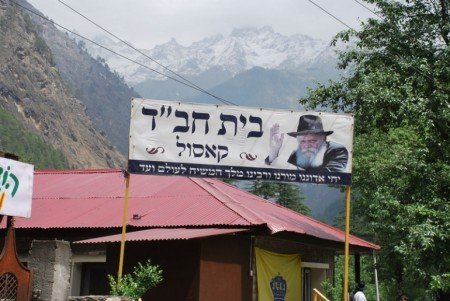|
I work for the Chabad Center of Kosul, a tourist destination in Northern India. The center operates only during the summer months. After the summer, most tourists clear out, leaving the center without much work to do.
This year, during the Sukkot holiday, most of the Israeli tourists had already left the city. I decided to hop over to the Chabad Center in Rishikesh, where they were planning a large festival for all those who had had contact with Chabad all over India.
Rishikesh is a twelve-hour journey from Kosul. I knew that many of our "customers" from Chabad of Kosul planned to go to the festival, at our suggestion. Therefore, I felt that it would make sense for me to go there, in order to strengthen my connection with them and encourage them in their observance of Torah and mitzvot.
I purchased two tickets, for myself and my wife Hila, and we began to plan our trip. At that point, there were also two Chabad Yeshiva students in Kosul who had come to help us in our activities. I told them of my plans to travel to the festival, and informed them what their responsibilities would be in my absence. Immediately, they asked me: "Have you informed the Rebbe of your plans?"
For a moment I was taken aback. It had not occurred to me that there was any reason to ask the Rebbe. The Israeli tourists in Kosul had already left the city. There was not much for us to do in town, and in Rishikesh I would certainly have a lot more work to do. Why should I ask the Rebbe before traveling?
On second thought, though, I realized that they were right. It was proper to ask the Rebbe before undertaking any trip. I wrote up my plans and placed the letter into volume 18 of the Rebbe's letters.
The answer, on page 351, was to a Chassid who planned on leaving his synagogue, for various reasons. In his letter, the Rebbe expressed a sharp opinion that it was improper for him to leave the synagogue. On the contrary, he should try to improve matters where he was, and stay in his place.
After this clear answer, we knew that we would stay in Kosul. We immediately canceled our trip. I managed to sell one of our tickets, but was forced to take a loss on the second.
A few hours later, we understood clearly why we had to be in Kosul. That evening, three Israelis, who seemed to be in trouble, approached our Chabad Center seeking help. Two of them were slightly high on drugs. The third one, however, was really in bad shape. We found out that he had taken a huge overdose of drugs, which caused him to completely lose his equilibrium. He garbled incoherently, appeared to be delusional, and thrashed about violently. His friends were at a loss how to handle him.
His extreme, violent outbursts, if not brought under control, could land him in trouble with the police. Furthermore, his health was quickly deteriorating. It was clear that immediate action was called for. India, as a third-world country, was not equipped with drug treatment centers or psychiatric facilities.
The first decision I made was to keep the young man at my side and make sure that he did not imbibe any more drugs. It was no easy task. The young man had not slept in several nights, and there was no one I could turn to for assistance.
In the meantime, I managed to contact his parents in Israel. It took them a while to digest the information that their son's health was in a state of emergency, and he needed immediate care. Finally, after two days, they arranged to have their son flown to Israel.
As soon as he returned to Israel he was hospitalized. Thank G-d, the doctors were able to stabilize his physical condition, and his mental and spiritual health improved as well, until he was completely restored to health.
At that point, it was very clear to me why I had to remain in Kosul.
|

